20hx/they/it | transmandx'd autistic cDID systemtbmc ramcoa survivor and advocate
Don't wanna be here? Send us removal request.
Text
i absolutely cannot stand the lack of data, studies, and overall academic knowledge or understanding regarding aspd. its by far one of the most "umbrella term"-esque diagnoses in the DSM and its pretty damn clear that 99% of pop and past psychology has no intention of further educating on it. not only is there little scholarly drive to explore the disorder, it's outright just demonized and discredited. and i cant help but feel and know deep down that the next four years won't bring much more knowledge regarding the topic. instead we will see a drastic increase in the throwing around and slap labeling of prominent political figures, fascists, and neonazis with disorders like aspd or npd and terms like psycho/sociopath/narc.
#actually aspd#actually antisocial#aspd#cluster b#schizospec#actually psychotic#aspd safe#aspd thoughts#aspd traits#aspd things#aspd feels#aspd vent#antisocial personality disorder#antisocial traits#npd safe#npd traits#npd#narcissistic personality disorder#psychopathy#sociopathy
170 notes
·
View notes
Text
In-system relationships can be so intimate.
Waking up together, opening the same eyes, and stretching the same limbs. Yawning in time and saying a good morning that only you who are involved can understand what it's for.
Sharing a meal, not only from the same plate, but with the same hands and the same senses. Deciding what to eat together, something that fits all of your tastes.
Curled in the same bed, in the same blankets, in the same body, drowzily mumbling about nothing and everything to each other. Joking around and feeling their sleepy laugh as if it were your own.
Living life, and inviting them to share yours and your time in it--performing your daily tasks in the unison of cofront. Seeing and hearing and feeling everything together.
Feeling them blush when you flirt or compliment them. Feeling their joy when you get them a gift, or how safe you make them feel simply when you're around them.
Enveloped in the same love, from the same brain, with the same feeling of care for each other palpable between you. Feeling the emotions you feel yourself, coming from the other person. Feeling their love for you, in the rawest, most direct possible way.
3K notes
·
View notes
Text
Treating your headmates like separate people isn't worsening your condition by default by the way. Treating them with respect isn't making you dissociate more. Final fusion is a fine thing to try and achieve, but people need to understand that functional multiplicity is a thing you can work to achieve in therapy too. Please stop pushing the idea that you need to treat your headmates like a disorder or curse in order to heal. You can be happily multiple if you want that.
2K notes
·
View notes
Text
fellow narcissists, sociopaths, and psychopaths,
we're going to hear those words being thrown around a lot over the next few years. more than we already do, which is not an insubstantial amount. i want you to remember that you are not monsters, or fascists, or scum.
as more and more people throw around diagnoses they do not care to understand and words that they do not see as harmful, i want you all to remember that you are not alone and that the entire world is not against you.
there are people out there who care and understand and are not afraid. you are not alone, and you are not unloved.
dont let them make you fearful of yourself, you deserve so much better than that.
stay safe
4K notes
·
View notes
Text
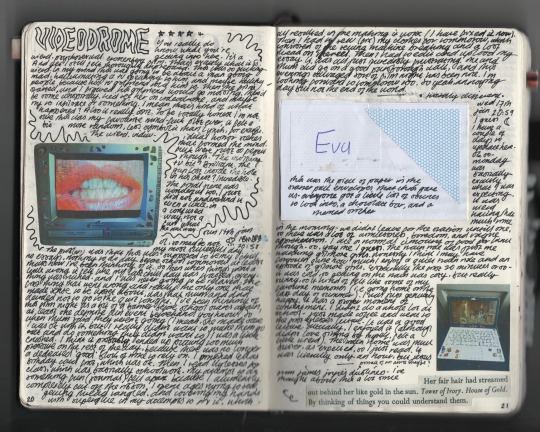
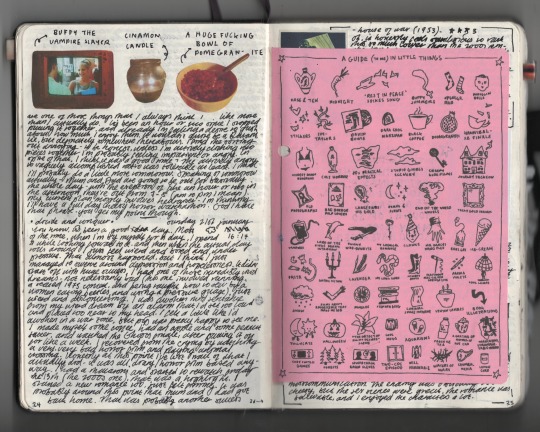
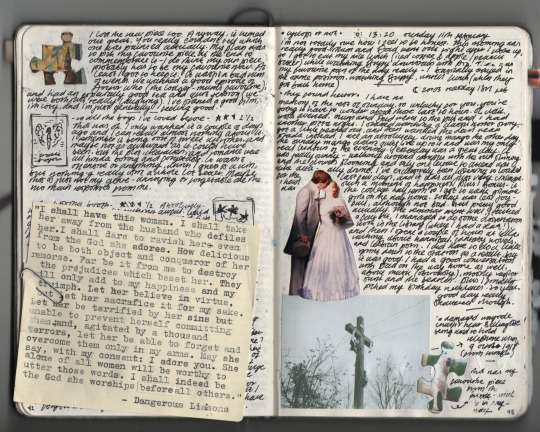
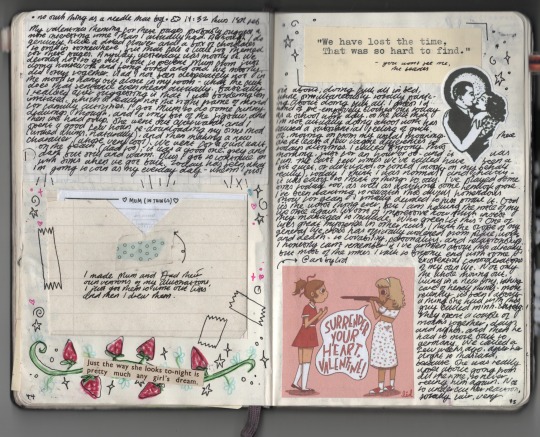
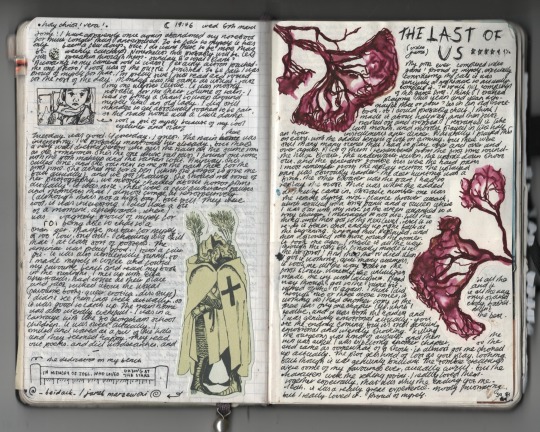

some recent pages (from my one-for-everything notebook)
899 notes
·
View notes
Text
WHY DONT ENDOS UNDERSTAND DNI 😭😭😭😭 praying for u guys fr ur delusion asf
0 notes
Note
hc-DID culture is relating to Twenty One Pilots Trench/Dema storyline a littleeee too much
.
9 notes
·
View notes
Text
ENDOS/PRO-ENDOS DNI
finally making an intro post!
﹍﹍﹍﹍﹍﹍﹍﹍﹍﹍﹍﹍﹍﹍﹍﹍﹍﹍
╰─ ♡ hi, im tyler/101 (the current host of the dollhouse system). our body age is 20 and we would prefer for minors to not interact with our blogs.
╰─ ♡ collectively please call us tyler
╰─ ♡ im a queer, intersex transman (and incredibly proud of it)
﹍﹍﹍﹍﹍﹍﹍﹍﹍﹍﹍﹍﹍﹍﹍﹍﹍﹍
╰─ ♡ we have autism, schizoaffective disorder, pf/cDID, GAD, CPTSD, sensory processing disorder, suspected ASPD and NPD. (also synesthesia but thats obviously not a disorder).
╰─ ♡ we are also physically disabled, and are being treated for POTS, chronic pain, chronic fatigue, chronic migraines, and chronic nausea, with suspected EDS, autoimmune disorder. we also use mobility aids as needed!
﹍﹍﹍﹍﹍﹍﹍﹍﹍﹍﹍﹍﹍﹍﹍﹍﹍﹍
╰─ ♡ things im interested in: writing, art, poetry, music>>, psychology, (will be adding on periodically), abuse survivor advocacy, cryptids, gore, otherkin, anything paranormal or occult related,
╰─ ♡ please feel free to send messages/anons/etc.
#intro post#introduction#blog intro#pinned intro#schizoaffective#creaturekin#cryptidkin#goblinkin#keyhouse system#did system#cdid system#pinned post#pinned info#new pinned#pinned bios#tumblr bios#bios#short bios#messy bios
5 notes
·
View notes
Text
omg i never thought i would actually have to post this but endos + endo supporters do not interact. being plural is not a fun quirky personality trait, its a disorder that people struggle a lot with. its a disorder born from continuous, inescapable trauma in early childhood.
stop creeping your way into communities you do not belong in. stop promoting "flooding" system tags and spaces. let us please have ONE safe space, because i assure you the people with DID/OSDD in this community didnt have a safe space for a majority of our lives. we do not want you in our spaces, please and thank you.
#actually did#anti endo#endo dni#endos fuck off#endos do not interact#endos not for you#keyhouse system#actually plural#cdid system#actually cdid#syscourse#system discourse#syscource
143 notes
·
View notes
Text
When ppl talk about alters being stuck in trauma time, they usually talk about those alters not knowing the body's friends, or recognizing where they live, or any number of physical reality changes. And we've definitely had that experience! But more often what "alters being stuck in trauma time" means for us is those alters know basic physical reality facts, but their emotional reality has not changed at all. So they might know our best friend, but they aren't connected to how that friend and I interact. They respond to everything like the trauma is still happening, so they expect any mistake to be met with punishment, they expect the ppl around them to suddenly hurt them without warning, they have no ability to use our modern coping methods, and they have no concept of anything being other than the abusive environment of our youth.
So yeah, our trauma-stuck alters typically know we live in a different house and our dad isn't coming home, and they know things like we graduated college and the names of our friends. What we struggle with a lot more is getting them to understand that this current time isn't just our childhood with new set dressings.
935 notes
·
View notes
Text
I am currently making a 《Therapy Diary》...
And the first thing I'm putting in it is a graphic(❔️) of all Personality Disorders together, to make a global assessment on my issues. [I call it the C-PTSD wheel, because I believe that all PDs are just C-PTSD in different fonts, but I think no one's ready to have this conversation yet.]
Anyway, since I believe it can be helpful for some people to track their overall PDs symptoms in order to compare them, here it is❕️
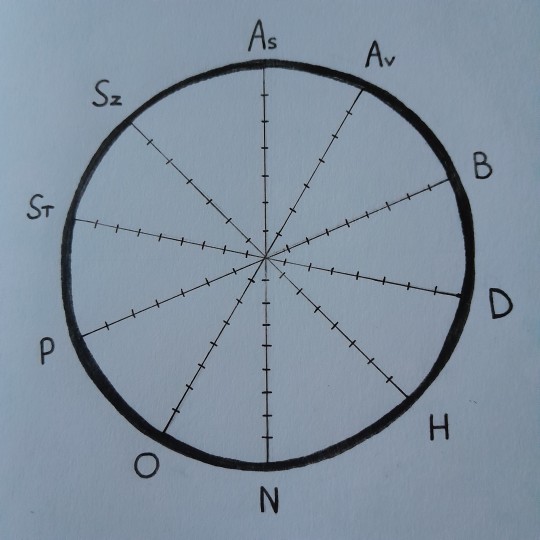
[you can use it and/or take inspiration from it] [credits would be appreciated, but not necessary]
Yeah I know it's wacky and kinda ugly, but it makes the job. Each Personality Disorder is classed in alphabetical order, and each dash on the PD's line is for 1 symptom of the diagnostic criteria. For example:
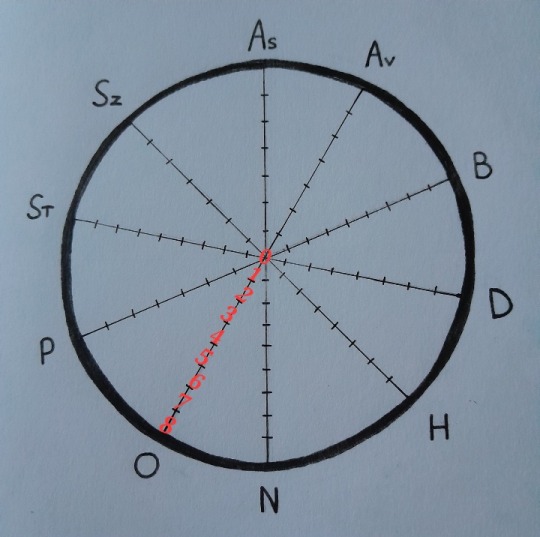
OCPD have eight diagnostic criterias, so it has seven dashes + the border as the maximum & the shared center to indicated a lack of symptoms.
In the end, it should look like something like this:
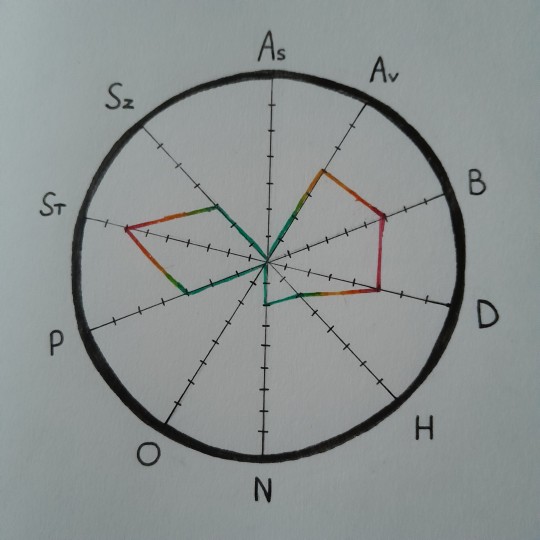
I personally put a color-code to distinguish when I can be diagnosed with the PD, have traits of the PD, or nothing at all... But it's not a must, as long as you have a shape, it tells enough. If you want to have a checklist for all personality disorders at one place, I'm putting them below:
AsPD checklist
AvPD checklist
BPD checklist
DPD checklist
HPD checklist
NPD checklist
OCPD checklist
PPD checklist
StPD checklist
SzPD checklist
177 notes
·
View notes
Text
the ramcoa community is popping off in the most annoying ways rn again. ugh. you guys act like this is a fandom or something and not literal organized and extreme abuse.
"but but! some ramcoa survivors agree with me and are uncomfortable with x!"
sorry? I don't recall the world revolving around me just bc my dad waterboarded and raped me with his friends. I don't recall the meeting where we agreed ramcoa survivors solely claim number or card names. I don't really remember when we agreed ramcoa survivors were some matyr pillar of what experiences people are allowed to have.
focus more on yourself. sure, I get really really heated when people misconstru and water down words like tbmc and ramcoa, but I don't walk around saying only ramcoa survivors can have animal alters bc my ramcoa resulted in them.
you don't get to police people just because you think your trauma is worse than theirs. stop playing trauma Olympics, bc that's what you're doing. you're saying since your trauma was "worse" and a type of abuse you get to police literal names.
you don't. sorry to break this to you. you're just a survivor like everyone else. you are not more or less valid than someone who wasn't tortured, trafficked, raped, etc. etc. etc. just because it was done in an organized manner doesn't mean you're more important than everyone else who was abused.
you do not own numbers. the world does not revolve around us.
91 notes
·
View notes
Text
"You wouldn't split from that" <- You don't know me, you don't know what my threshold is, you don't know what my support system is, you don't know what my current environment is, you don't know what my past history is, you don't know me.
"I split because I temporarily lost my favourite blanket."
"I split because I temporarily lost my most treasured possession that brought me comfort, safety, and security while in a violent and unstable environment with no support system and where theft and destruction of property were very reoccurring and severe issues."
Both sentences are just as valid. You don't owe anyone context, an explanation, or more information if you don't want to. Triggers, stress, and trauma are all subjective in how they affect people. Everybody handles things differently, everybody has different situations, has different histories, has different experiences.
572 notes
·
View notes
Text
Unmasking 101
This is our own post covering unmasking as a system, something that we have been able to accomplish to an extent that we are quite comfortable with. We hope that it will prove useful to some of y’all!
Disclaimer: we are one system with DID, and we can only provide our own perspective at this time. What has worked for us may or may not work for you, so use your best discretion when following the advice listed here!
What is masking?
Masking is the concept of hiding, disguising, and/or suppressing neurodiversity in an attempt to appear neurotypical. Neurodiverse people may mask for a wide variety of reasons, including to help keep themselves safe, to fit in and make friends, to avoid drawing unwanted attention, to be taken seriously by others, and more. While masking most often refers specifically to autistic experience, anyone with any sort of neurodiversity can mask.
Masking vs. Covertness
Quite often, complex dissociative disorders like DID are covert, meaning their symptoms may not be easily noticed or recognized by outsiders. Having covert symptoms is not the same as masking! It is possible to live a happy, healthy life with a covert disorder, without ever needing to “unmask” or trying to make your symptoms more noticeable.
What’s most important is learning how to live an authentic life that helps you and your system feel safe, comfortable, and happy as you are! In fact, attempting to unmask when in actuality your disorder is just covert, this could have negative, harmful, or otherwise adverse affects on your system. It’s never good to try and force yourself or your headmates to be something you’re not, and this goes for systems with covert symptoms and presentations!
What does masking look like?
In systems, masking can look like:
- other headmates acting like the host when they front
- the whole system adopting similar mannerisms in order to appear as a singlet
- acting like memories, events, and things around you are cohesive and make sense to you when they really aren’t
- pretending to recognize others or recall information that you simply cannot remember
- attempting to quell or silence internal communication and dialogues between other system members
- consciously or unconsciously ignoring signs or plurality in your own life
- copying or mirroring the actions and behaviors of the singlets you meet and interact with
And so much more! Every system is different, so masking can look very different from system to system.
How can we unmask?
Unmasking is a process that may take lots of time, patience, and effort to achieve. But it most certainly can be done! Here are a few steps you may take while undergoing this transition from masking to unmasking:
1) Recognize when you are masking.
Try to notice when you or your system members are attempting to hide, disguise, or otherwise conceal your plurality. What actions do you take to mask? What situations do you find it easier or more difficult to mask? Do certain headmates tend to mask more than others? Do you tend to mask more around certain people and places?
At this stage there’s no need to try and stop masking immediately. Just try to take it slowly and start noticing masking behaviors as they arise. If you have a system journal or some other place where you all keep thoughts organized, perhaps make a list of the masking behaviors you all are noticing in your system. Recognizing behaviors is a solid first step towards changing them!
2) Understand why you are masking.
Quite often systems mask as a self-defense mechanism. Are you in a safe environment? Do you still live, work, or associate with abusers or others who would not understand your plurality? Who benefits from your system masking? Who is harmed? Is masking easy and second-nature for your system, or is it difficult and exhausting? These sorts of questions can help answer whether or not it will be safe to mask, and whether or not you actually are masking or just have a covert/less noticeable presentation for your system.
3) Have internal conversations.
To better understand yourself, your system, why you mask, and when you mask, internal communication is key. You may have headmates who are purposefully masking in order to protect themselves and your whole system. You may have in-system roles and functions that are specifically dedicated to masking. You may have headmates who were masking without even being aware that they were doing so. Having lots of safe, open, and welcoming discussions with your headmates can help you better understand masking in your own system, and how best to formulate a plan to unmask in your daily life.
You may ultimately come to the conclusion that masking is what’s best for your system at this time, and that’s okay! Please prioritize your own health and safety over your desire to be your authentic selves. Sometimes it just isn’t safe to attempt unmasking. You know yourself, your system, and your situation best, so try to work together with your headmates to come up with a plan that works well for everyone!
4) Encourage internal and external authenticity.
Once you have a good idea of when, why, and how your system masks, you can start taking steps to change these actions and behaviors (granted, that you are in a safe place to do so!). In our experience, this can be achieved by encouraging headmates to branch off in their own ways as they have the desire to do so. Creating a safe space inside where headmates can feel secure in exploring their identities is crucial for unmasking!
It may happen slowly, but it starts by encouraging small actions and desires that headmates have which differ from each other. A headmate wants to use a specific tonal inflection that’s different from fellow members? Go for it! A headmate wants to engage in an activity that is uncharacteristic for their system as a whole? As long as it’s safe, do it! Creating an internal environment of acceptance and then encouraging each other to embrace small moments of authenticity can help chip away at that mask.
5) (if possible) Build an outside safe space.
If your system has another person in your life who knows about your plurality and is willing to accept you all unconditionally, this can be incredibly healing and work wonderfully to help unmask. Just existing around our therapist and our partner system have helped us to embrace our individuality and accept our unique features when fronting. If there is a loved one in your life who knows about your system, maybe try explaining the concept of masking to them, and ask them to help support you through this unmasking process.
If there is no one in your life who you can safely unmask around, you can still try to practice unmasking by doing so when you are alone. But please, try to center your system’s safety as you go about this process! Don’t attempt to unmask if masking is what’s keeping your system safe, healthy, and alive.
6) Don’t compare yourselves to others.
It may be tempting to compare how your system functions to others. Some systems might have never had to mask. Some might find unmasking to be a quick and easy process. Just because it may be difficult for you doesn’t mean that it’s impossible! Please try to avoid comparing yourselves to other systems, and even other headmates in your own system. Some headmates may be able to unmask more easily than others, and that’s okay! Respect each headmate’s individual needs and abilities, and go at your own pace.
What if we go back to masking after unmasking for a while?
This is only natural! After habits have been built up and practiced for so long, it can be difficult to change them in a permanent way. Masking after unmasking for a while is nothing to be ashamed of, and doesn’t mean your system has lost any progress! Many systems may find that their unmasking process happens in waves or cycles, with each cycle of unmasking followed by a masking period. The more and longer you’re able to unmask, the shorter your next masking cycle may be!
Don’t give up! If you find that your system has reverted to old ways, simply start at the beginning, show yourselves patience and understanding, and start recognizing when you mask once again.
In Conclusion
A TLDR might be: masking, or hiding/concealing neurodivergent traits, is common in neurodivergent people. Masking is not the same as having covert symptoms, so please try and understand the differences before attempting to unmask. Masking can look incredibly different and have a wide range of presentations. By learning about yourself, understanding when, why, and how you mask, having internal conversations about masking, encouraging authenticity, building internal and external safe spaces, and having patience with yourselves, you can start trying to unmask. Having a safe person to be open with about your plurality may help with this process, and avoiding comparing yourselves to others can help too! If you regress, backslide, or go back to masking after a while, that does not invalidate your progress - keep going and don’t give up! In all of this, center your system’s safety and security, and don’t attempt to unmask if it could be dangerous for your system.
We’re sorry this got so long (this is actually a very complex topic!) but we hope this helps! If anyone has any further questions regarding masking or unmasking as a system, don’t hesitate to reach out. And of course, we are just one system providing our perspective, so don’t be alarmed if what we’ve said here isn’t all that applicable to your system.
If you’ve made it this far, thank you so much for taking the time to read! We’re wishing you and your system the very best of luck in your unmasking endeavors. Take care, and have a wonderful day!

137 notes
·
View notes
Text
If one more person says RAMCOA is a conspiracy theory, that my lived, VILE life altering, world-shattering, body breaking experience is a “conspiracy theory”!!!??!
Glad you have lived such a sheltered life to have the luxury of it all….
Fuck off
121 notes
·
View notes
Note
hi, thanks for all your help. what kinds of things do you think crow programming might consist of?
Crow programming can have various meanings depending on the script, belief system of both.
Crow Programming-Crows are the keepers of the rules and laws. They are in positions of power in their system.
There is a crow in the seven seals programming.
Oz
9 notes
·
View notes
Text
i stand by what i said before the clancy release 🙏
my personal headcanon is that c!tyler has DID and clancy is an alter made to protect him and rebel against their abusers. with clancy, josh AND BLURRYFACE representing parts of the system. trench, dema, voldsoy are all parts of his inner world.
navigating is so insanely system coded i am so unwell over it.
"im navigating my own head, disassociate"
i also wanna drop this clip because... they are so clearly mocking tylers coping mechanism.
"josh are you hiding? where are you? come here you little moron, you."

SIGH. i will die on this hill.
60 notes
·
View notes